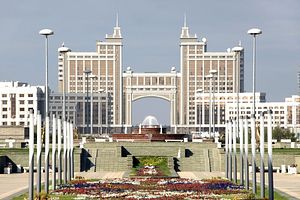A report recently published by the Asian Development Bank (ADB) outlined a forecast for the “Developing Asia” region, which spans Central Asia to the Pacific. Low oil prices have helped Eastern emerging markets to counterbalance the strengthening of the dollar vis-à-vis global currencies and commodities. Thus, growth in the area covered by the ADB will remain constant at 6.3 percent for the next two years; even inflation is supposed to fall on average. Through the looking glass, however, Central Asian countries are the ones bound to suffer the most.
According to the ADB classification, “Central Asia” includes all eight countries in the post-Soviet region to the south of Russia (from Georgia to Kyrgyzstan). Across the region, the depreciation of the national currencies will trigger inflation, while low oil prices will negatively affect the budget in several countries that rely on the windfalls from hydrocarbon exports. A boon for the rest of energy-dependent Asia, falling oil prices can be a curse for Central Asia. Kazakhstan, Turkmenistan and Uzbekistan are all poised to suffer.
The crisis in the Russian Federation, caused by diminishing revenues from energy export and the fall of the ruble, worsened by Western sanctions, will result in a shrinking labor market, pushing Central Asian migrant workers away. The tougher legislation on foreign workers – who have to pass a Russian language proficiency exam and meet the requirements to enroll in health insurance schemes – will also limit the possibilities for migrant workers, who might choose other destinations. In fact, most Central Asian currencies have not devalued as much as the ruble against the dollar, which means that remittances have been losing value. The galloping inflation and the threats of further devaluation induce the ADB to see “recession next door” for Central Asia.
Economic setbacks in Russia have also influenced Central Asian exports. “Exports from Central Asia declined, by 5.4%, with sharp reductions in petroleum shipments and sluggish demand from the Russian Federation” writes the ADB. A negative trend in the trade balance will turn into a small current account deficit for 2015 across the region. To sustain growth, countries that have the financial possibility are funding construction projects with government money. Rising unemployment and cuts in social expenditures could be a threat to the stability of the regimes all across the region. One of the most troublesome sectors, according to the ADB, is the mining industry, poised to fall by 10 percent in 2015 in Kazakhstan. In Tajikistan, the national aluminum company, TAlCo, will experience a 30 percent drop in output this year, which is potentially dangerous for the whole economy as it represents the country’s leading exporter. In Kyrgyzstan, instability at the Canadian-controlled Kumtor gold mine can jeopardize output for the single most important business venture in the country.
Investment from China, around $6 billion in 2015-17, should mitigate the crisis and boost the development of infrastructure in the region. Moreover, while Russia’s demand for Central Asian natural gas is plummeting, China is completing the last sections of the pipeline that will reorient eastwards gas from Turkmenistan, Uzbekistan and Kazakhstan. Gazprom, Russia’s state-owned gas company, will virtually cut to zero imports from Turkmenistan, slash to one billion cubic meters from Uzbekistan, leaving Central Asian countries without the most important export vector that has been the main source of income since independence.
At this global economic crossroads, Central Asia is seen as the black sheep of the broader Asian continent. Dire economic conditions in Russia and the strength of the dollar will have a negative impact on the region, which will have to rethink its economic policy in order to face these challenges.

































